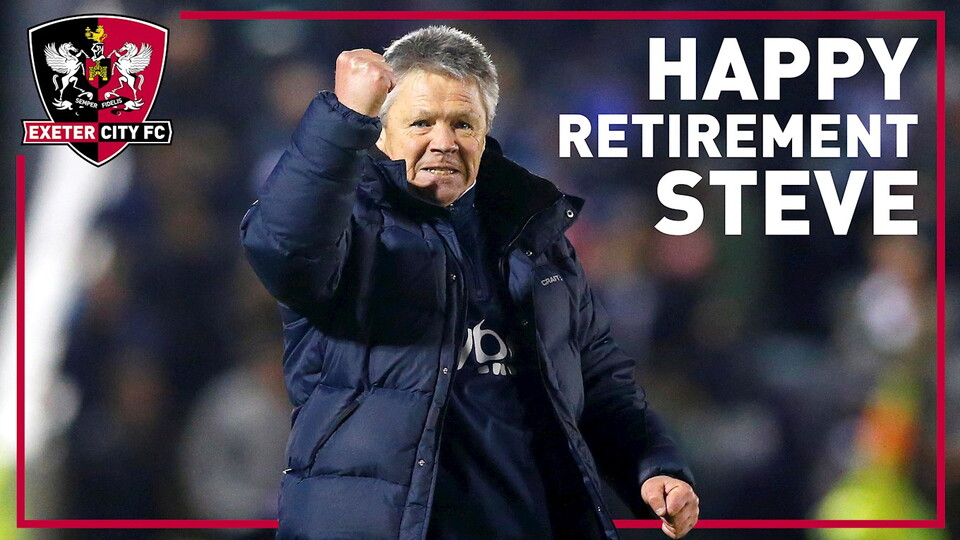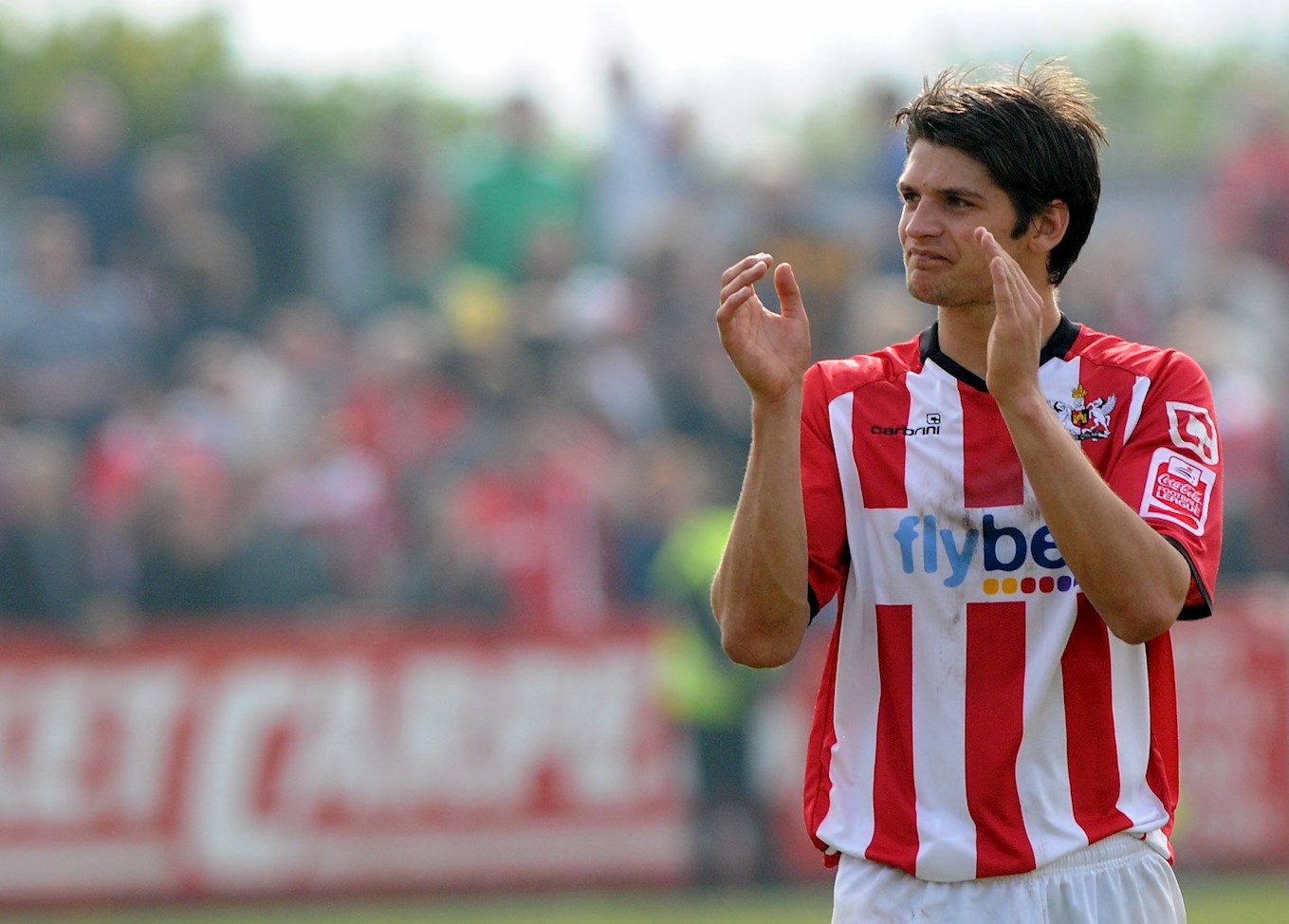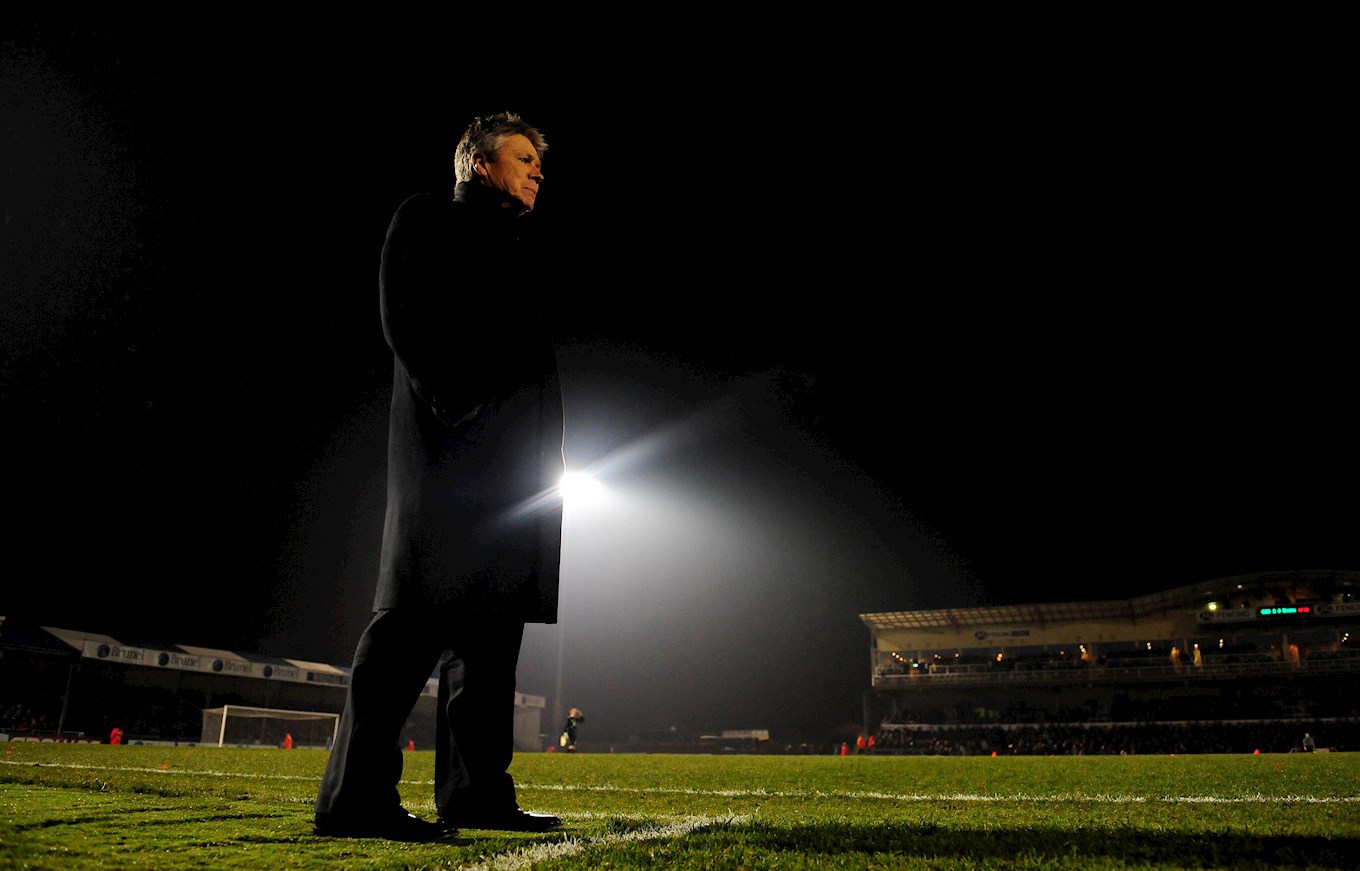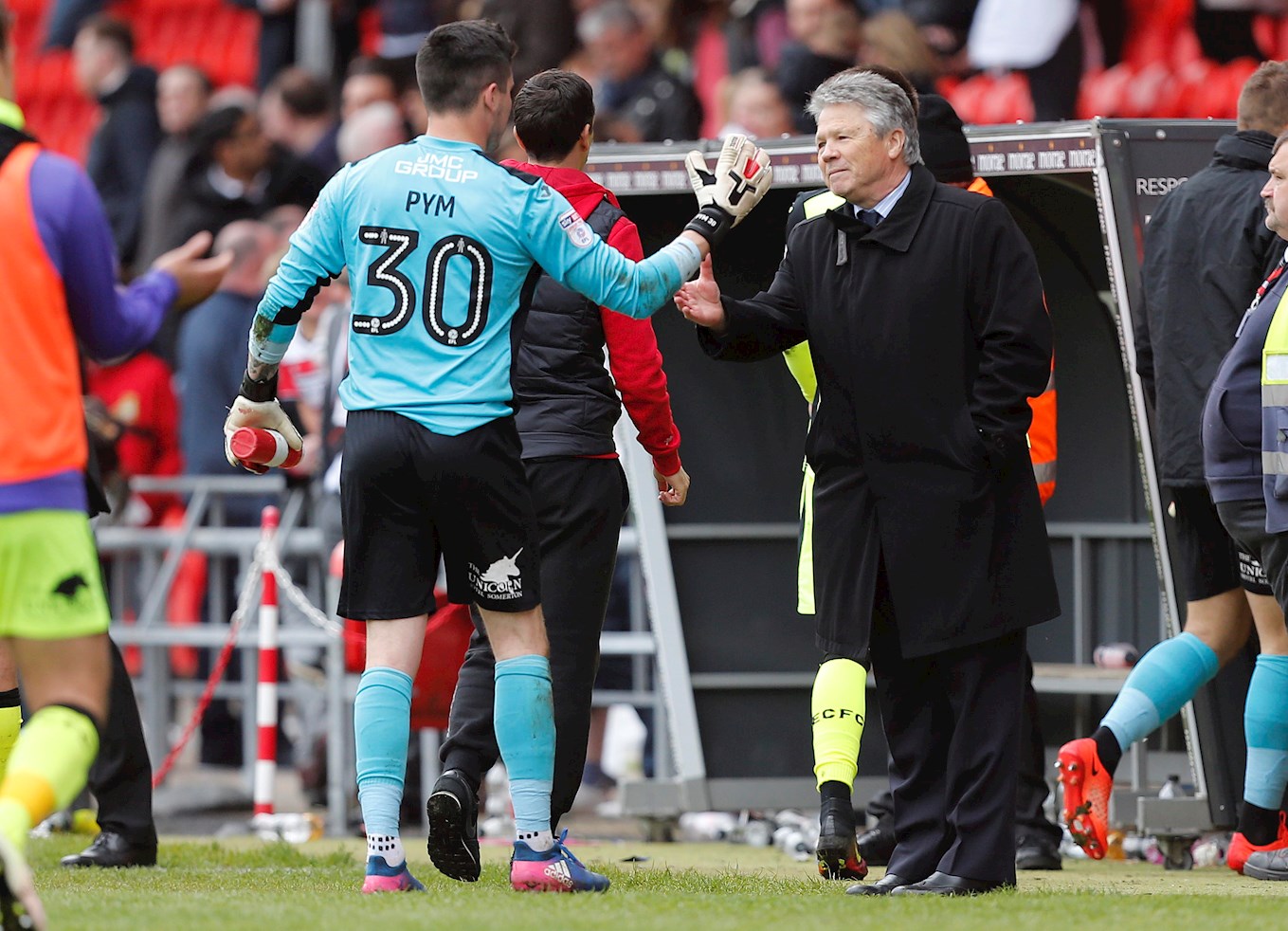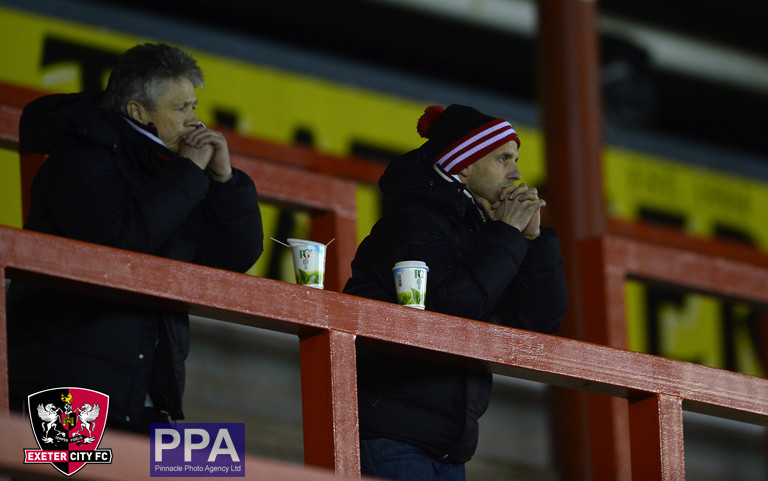Having made 866 first team appearances for Tottenham Hotspur, winning two UEFA cups, two FA cups, and two League cups, Steve Perryman knows what it takes to succeed in football.
There are no shortcuts, and while you need luck along the way, you have to have an attention to detail and a desire to improve by doing things to the best of your ability.
“If I see untidiness, laziness or arrogance here, I can feel a bad result coming,” says Steve, sat in his office at the Cliff Hill training ground having announced that his long association with Exeter City will be coming to an end in the summer.
“Is that clever? No, I think it is common sense. It is a discipline and way that you lead players, not only how to play but how to live, especially when they are in this house – our house, our training ground.”
In the 17 years that Steve has been working for the Grecians, City have gone from a side struggling at the bottom tier of English professional football to a financially stable club that has produced a host of talented young players.
Dean Moxey, Ethan Ampadu, George Friend, Liam Sercombe, Matt Grimes and Ollie Watkins have all benefitted from Steve’s advice and coaching and gone on to succeed for City and play football at a higher level.
"I owe him a lot,” said Liam, who is now plying his trade at League One Bristol Rovers where he has been voted their player-of-the-year.
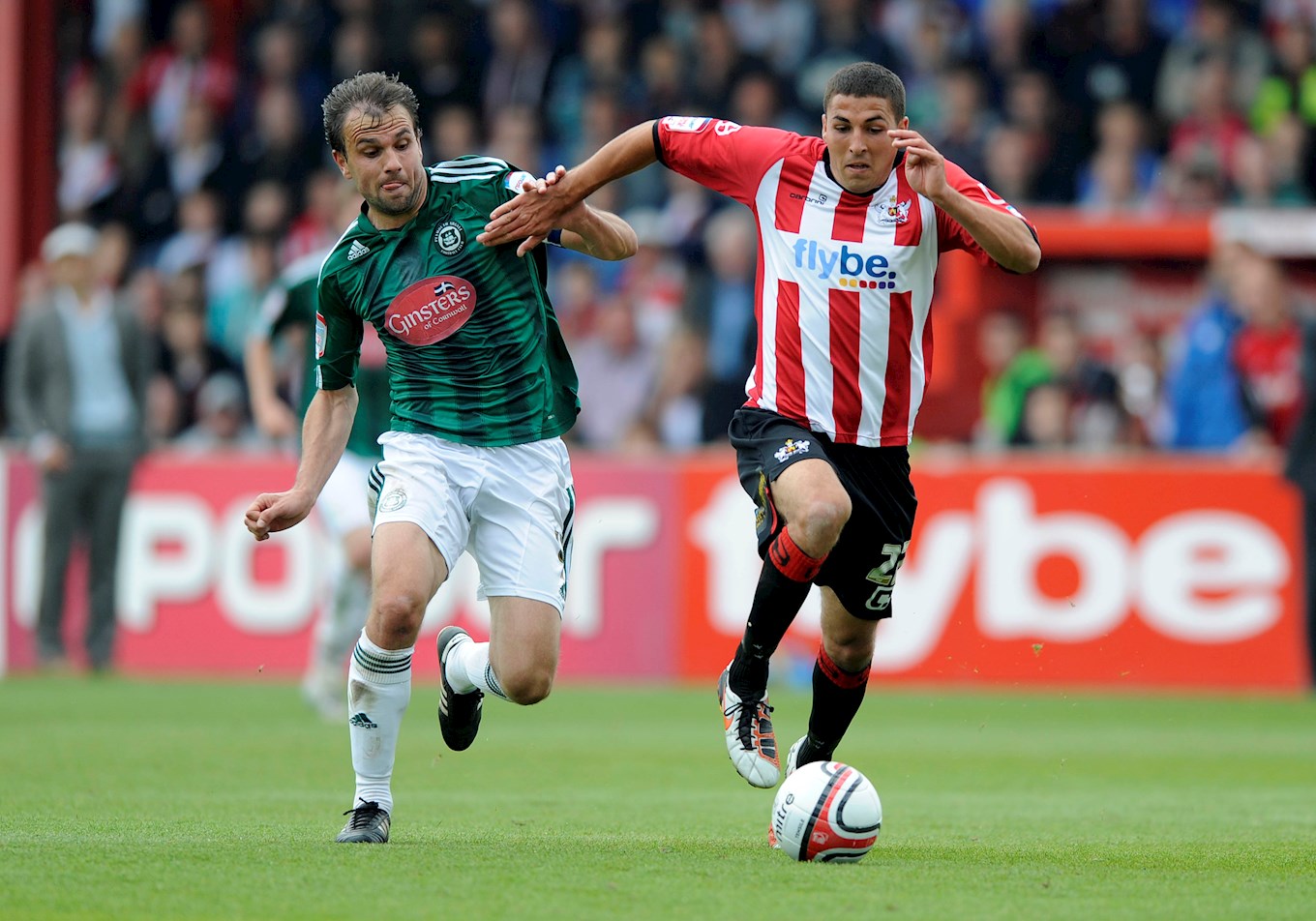
Liam Sercombe in action for City against Plymouth Argyle
“From a young age, he always used to drill into me lots of things. For example, if I was doing shooting he would always teach me to keep the ball low, into the floor, and hit the target.
“I used to always hit the ball over the crossbar and would get some stick for him for that, but now I rarely do and I feel that is down to Steve from what he used to drill into me.
“I used to love Steve’s Saturday morning sessions at the training ground. He used to do technique sessions and they were so enjoyable. He was big on technique and he used to say ‘work as hard as you can and with imagination’.”
Liam also used to love Steve’s enthusiasm at games.
“I used to hear him all the time over on the Old Grandstand, when I was playing,” said Liam. “I would hear him clapping and starting songs. I actually came to Exeter recently to watch a match and he is still exactly the same.
“Steve doesn’t change. He loves the game and he loves winning. I think it would be a massive tribute to him if Exeter could go up on Steve’s last season. That will be great for Steve to have that.
“He works so hard for the club. He takes care of everything and he wants to make sure everything is spot on. He is a great man.”
Steve is also an avid supporter of fair play and that is something he put right at Exeter City the moment he was asked to take the job as director of football by his old friend Joe Gadston.
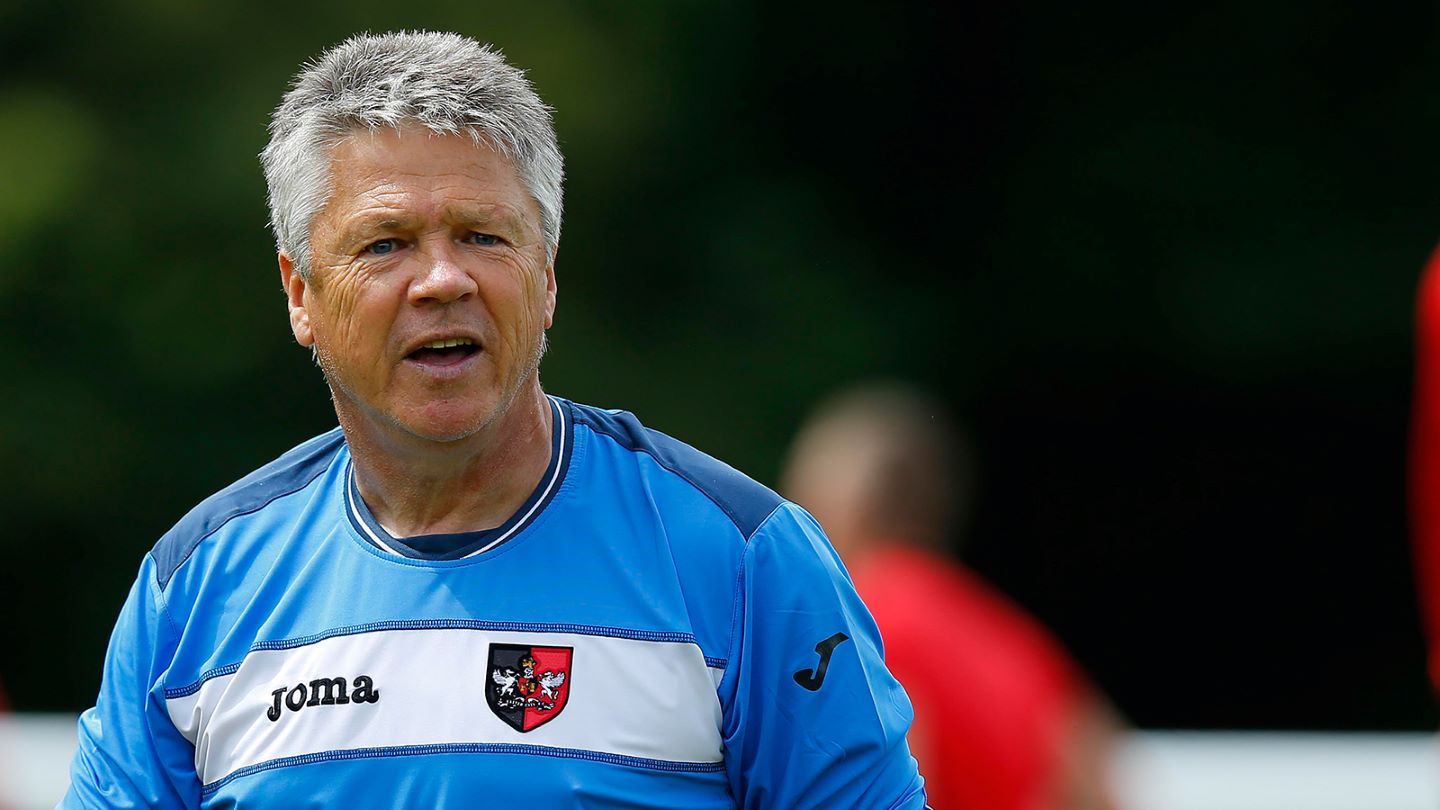
Steve Perryman first started helping out City in January, 2001 - 17 years ago
He could see that ill-discipline was costing the Grecians. City, under player-manager Noel Blake, had managed to pick up just one point from a possible 30 when Steve arrived in January 2001 and they found themselves at the foot of fourth tier of English football heading into a local derby at Plainmoor.
“I thought if I am going to give them advice, I better see them play,” recalled Steve. “So I turned up at Torquay and sat in the director’s box and they got a red card after 10 minutes for the captain Chris Curran.
“So when it got towards half-time I was thinking ‘do I go into the dressing room and introduce myself or not?’
“However, I had travelled all the way from Buckinghamshire so I thought I might as well. Noel (Blake) was giving his talk and turned around and saw me on the back wall and introduced me and asked me if I had any comment.
“My first comment was ‘if you carry on like I have just seen, you won’t finish the game because you won’t have enough men on the field. So do yourself a favour, why don’t you start playing football, give the referee a break and see what happens’.”
City improved in the second half, equalising through Christian Roberts before going on to lose the game 2-1 in injury-time.
However, Steve saw enough progress, and room for improvement, to agree to help player-manager Noel until the end of the campaign.
City went on to win eight out of their last 18 matches, drawing another six and losing just four. They finished in a comfortable 19th position, above Torquay, and eight points clear of safety.
Steve left at the end of that season, to manage once more in Japan. And when he returned to England, City had been relegated from the Football League and were on the brink of financial ruin.
The Supporters’ Trust had taken over to save the club from going under and placed rookie manager Eamonn Dolan in charge, who only agreed to take the job if Steve would help him the same way he had helped Noel.
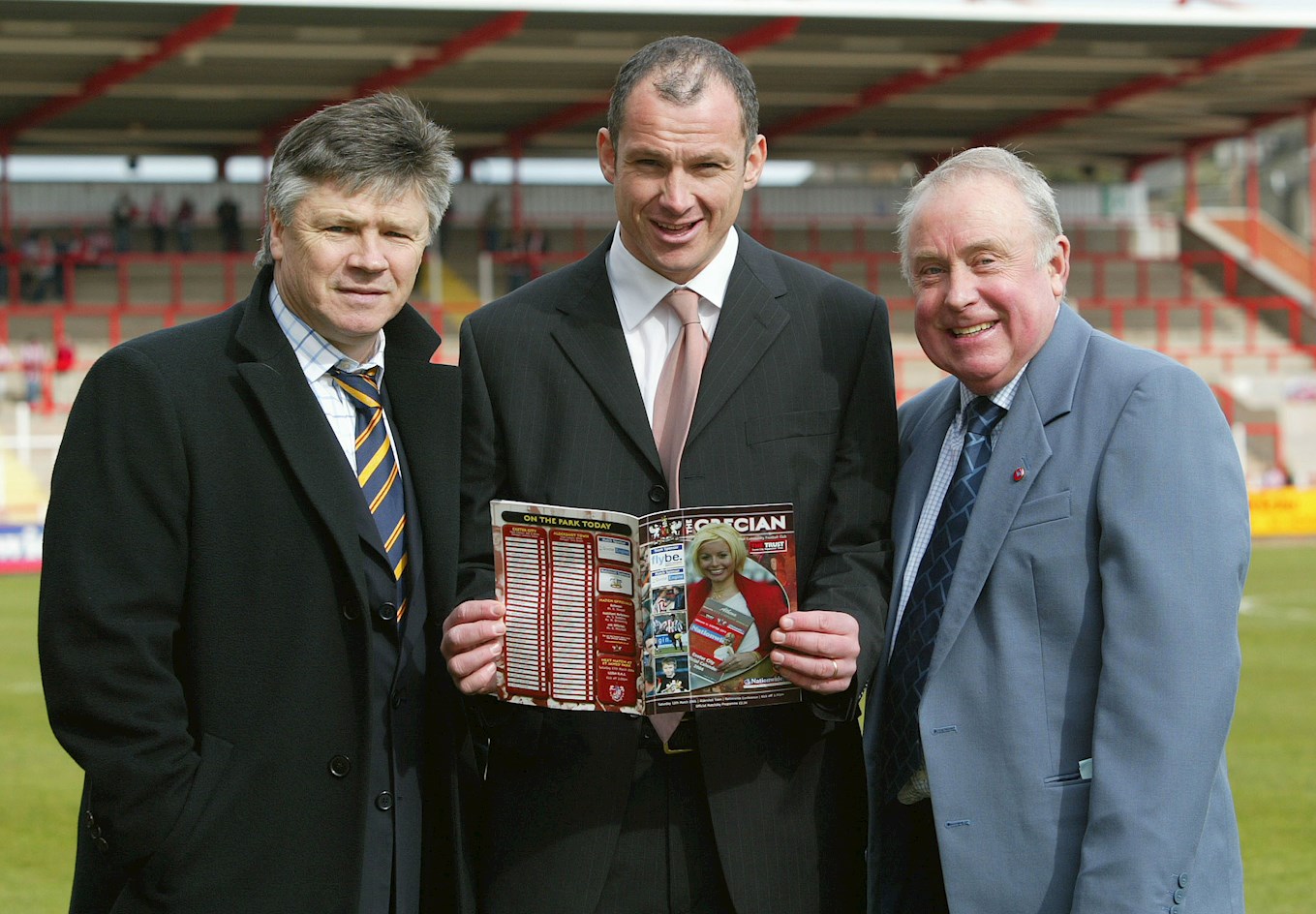
Steve Perryman (left) with former City manager Eamonn Dolan (centre)
“He (Eamonn) worked hard and expected people to work hard alongside him,” said Steve. “He was a good listener. I was more than happy to pass on any experiences that I had gained to him and he was opened-eared and open-eyed.
“Typically, he asked me something one day about an aspect of football. He was always posing questions – they were coming fast and quick – and I said: ‘Eamonn I have got absolutely no opinion about that’.
“He loved that answer because, I suppose, what it meant was that I am not a know-all. I know what I know. I don’t know what I don’t know and I am not going to pretend any other way.”
So Steve, Eamonn and the rest of the City staff set about improving the club the only way they knew how. The Grecians had no money so they had to promote from within and that meant focusing on the young players, teaching them the disciplines of playing football the right way and trying to improve them.
George Friend was one of players to benefit from the work Steve, and the rest of the coaching staff, did in the early years of Supporters’ Trust ownership.
George Friend who has gone on to captain Middlesbrough in the Premier League and Championship
George signed his first professional contract in March 2006 and he says that Steve must take a lot of credit for the long list of players that have succeeded at Exeter City and gone on to bigger and better things.
“He prepares you for life in football, whether you stay at Exeter for the rest of your career or not,” said George. “He gives you that base. It is not just coaching, he also helps you as a person and I think that is important as well. I really thank him for all of that. He has been a huge influence on my career.”
George added that he could see the love Steve had for City as soon as he first met him.
“My first memory of Steve is when I saw someone in the distance at the Cat & Fiddle on the far pitches picking up litter and replacing divots,” he said. “I remembering thinking ‘that doesn’t look like the groundsman’ and as the person came closer I realised it was Steve Perryman, our director of football and huge player for Tottenham back in his playing days.
“That is just the kind of person he is and that is a memory that always sticks in my mind. It shows that he is there for the club and those in the club, not just for himself. He is a really great person to have around.”
Steve Perryman inside his technical area at an Exeter City match
“Pitch culture is one of the ways I judge the quality and seriousness of a club at any level,” admitted Steve. “When I came to Exeter there was no pitch discipline and I thought ‘do you want your pitch to be as good as it can possibly be?’ Yes, then treat it well and have a pitch culture.
“In one of my first few games at City, I saw referees, linesman and players pulling bags on wheels from the corner where the tunnel and dressing rooms used to be in the Stagecoach Stand to the far corner of the pitch because the car park was behind the Big Bank.
“At the time, there was a track around the pitch. I found that very strange as I had never seen anything pulled on a pitch before and things have got to be done correctly. If you want a respectful pitch to play on, then respect it.”
Part of that respect means, of course, looking after the pitches at the training ground as well and while some players found it strange that Steve took that job on himself, to him it was not really noteworthy.
“I have a huge respect for the volunteer group who help out at the club and especially those that bring their spirit and energy to the training ground,” said Steve.
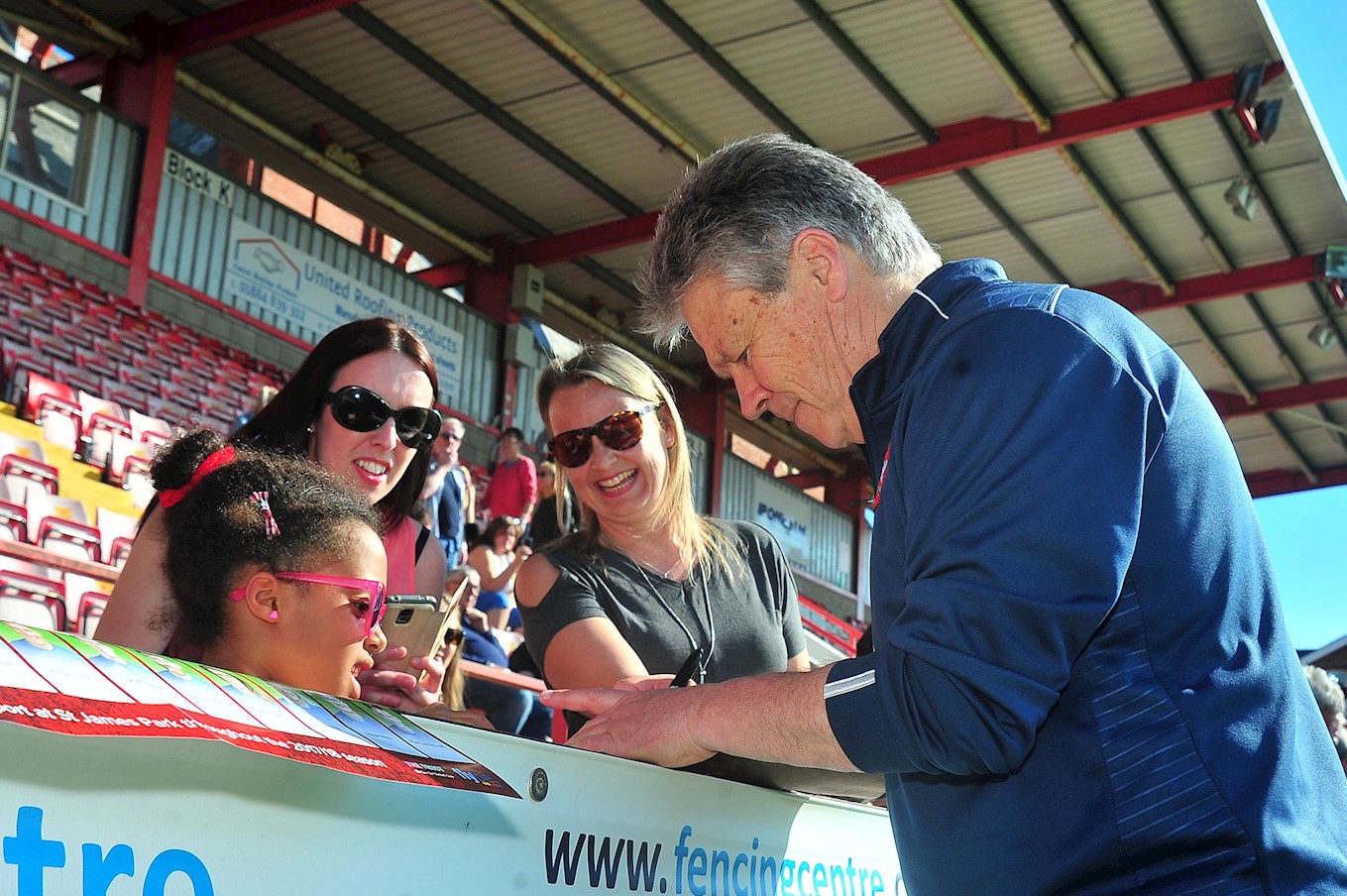
Steve signing an autograph for a young supporter
“They do such a fantastic job for the club, but if a bin needs emptying or litter needs picking up or a divot need placing back, I wouldn’t ask anyone else to do it. I just do it myself.”
Added to that, in the early years, Steve was pretty much a volunteer as well as he didn’t get paid for the job he was doing until the club could afford it. It led some people to question his sanity.
“Well you are talking about my wife as she was the main person calling me mad,” smiled Steve. “But the club didn’t have any money to pay me. I could say give me X amount but all they are going to say is we haven’t got that.”
Steve says it was the love of working with the players, coaches and managers he has down the years that has kept him at Exeter City so long.
“I am only involved in football to improve what I see in front of me. I just want to work with the players that we have.
“The job is a dream. I live in Lympstone. I travel 10 minutes to this very nice workplace. I don’t mean nice facilities, although they are improving. I mean a nice feeling.
“We have a group of people who are all pulling together to enable this club to improve.
Christy Pym and Steve shaking hands after a victory
“It was in the Conference and we did get Exeter to their joint highest position ever. We have come down off that perch since but I think this club is improving and moving forward.”
That closeness and connection with the people he works with has continued even when some of them have moved 350-plus miles up the country.
George (Friend) would play three seasons for City in the Conference before helping them regain their Football League status, with a play-off final victory over Cambridge United.
And when he did, Wolverhampton Wanderers came calling. He is now turning out for MIddlesbrough, having captained them in both the Championship and Premier League, but when he is in need of advice there is always one person on the other end of the phone.
“He is probably sick of it when he sees my name ringing, but he always answers,” laughs George. “He has been one of the biggest influences in my career and the fact that I am still ringing him at 30 years old, proves that and what he is like as a character.
“It is very easy for somebody to say when you leave a club ‘I’m always on the end of the phone’ but then you don’t hear from them.
“However, every single time I ring, Steve is there to talk. There is nothing that he can get from that. I have left the club years ago and yet he is still talking to me and helping me. It shows the person he is and great credit should be given to him.”
As well as being approachable though, Steve has a presence around the training ground. That is something which Ollie Watkins noticed quickly when he was coming through the youth ranks at Exeter.

Ollie Watkins who was sold to Brentford in the summer for a club-record fee of £1.8m
“I was always quite scared of Steve,” admitted Ollie. “I remember when I was training with the pros, when I was still part of the academy set up, he came across as a very powerful character with an excellent reputation in the world of football.
“You wanted to try and impress Steve for those reasons, but it was always quite hard. I don’t know if he saw a bit of belief in me so he got on to me for that reason, but he did always like it when I did a no-touch turn.
“I can remember his technical sessions and they were so much fun. I would be able to run one of his sessions now because I can remember it all so well. He is a great character.”
Having managed to impress Steve enough to get into Exeter City’s first team, Ollie went on to be voted last season’s EFL young-player-of-the-year before securing a club-record £1.8m move to Brentford.
“I owe a lot to Steve,” added Ollie. “He was a big part in persuading Tis to give me a chance and to play me and he stuck by me. His experience helps because he knows what he is talking about. He will always give you an honest opinion without beating around the bush or putting it harshly.
“Ultimately that is what you need and I can remember at Exeter, when my form dipped, I went and spoke to him and he was there for me. The club will definitely miss him when he is not there.”
“I needed help and advice in my career so will always give my advice to any player who wants it,” explained Steve, who as well as setting high standards for everyone who works at City, demands respect from those that don’t.
“I am big on respect and I want Exeter City to be respected by the soccer world,” added Steve
“Part of my job here, when people don’t always understand the job of Steve Perryman at Exeter, is not to allow people to take the mickey out of this little club.
“Because that is how we are perceived from the outside – a little club. Therefore, be it loan signings, pre-season games or buying our best players, they all think we are here to be mugged.
“I am a blockage to that. I don’t let that happen, because if they are taking the mick out of Exeter City they are taking the mick out of me.”
Steve and Paul Tisdale watching an under-21s match from the Thatchers Big Bank
However, it is perhaps that attention to detail and desire to do things the best way possible which Steve will be remembered for the most. After all, it could have ended his association with the Grecians before it had even begun.
“I left my home in Gerrard’s Cross at about 5.30am and I got to the gates at around 8.30am,” says Steve recalling the first time he visited the club’s training ground.
“Raddy (Exeter City’s football secretary, Mike Radford) then the youth coach turned up and offered me a cup of tea and started making it with this white powder.
“I had never seen tea made like that before, so I asked what it was and he said ‘powdered milk’. I said: ‘Raddy, I am not driving three hours here for tea made with powdered milk.
“I wasn’t giving it the big I am,” explained Steve. “And it was said more in jest than anything, but I had just driven past all these fields, with all these cows in, to Devon – the county of cream teas – and I thought it was strange.
“If you are going to make a cup of tea in Devon, make the best cup of tea you can and that is certainly not a cup of tea with powdered milk.”
*Steve would like to thank all the supporters who have been in touch with him and sent him cards and letters of thanks for his work at Exeter City. He would also like to thank the supporters, led by Quinn George Elliott, who collected money to buy his wife a bouquet of flowers for his retirement.
